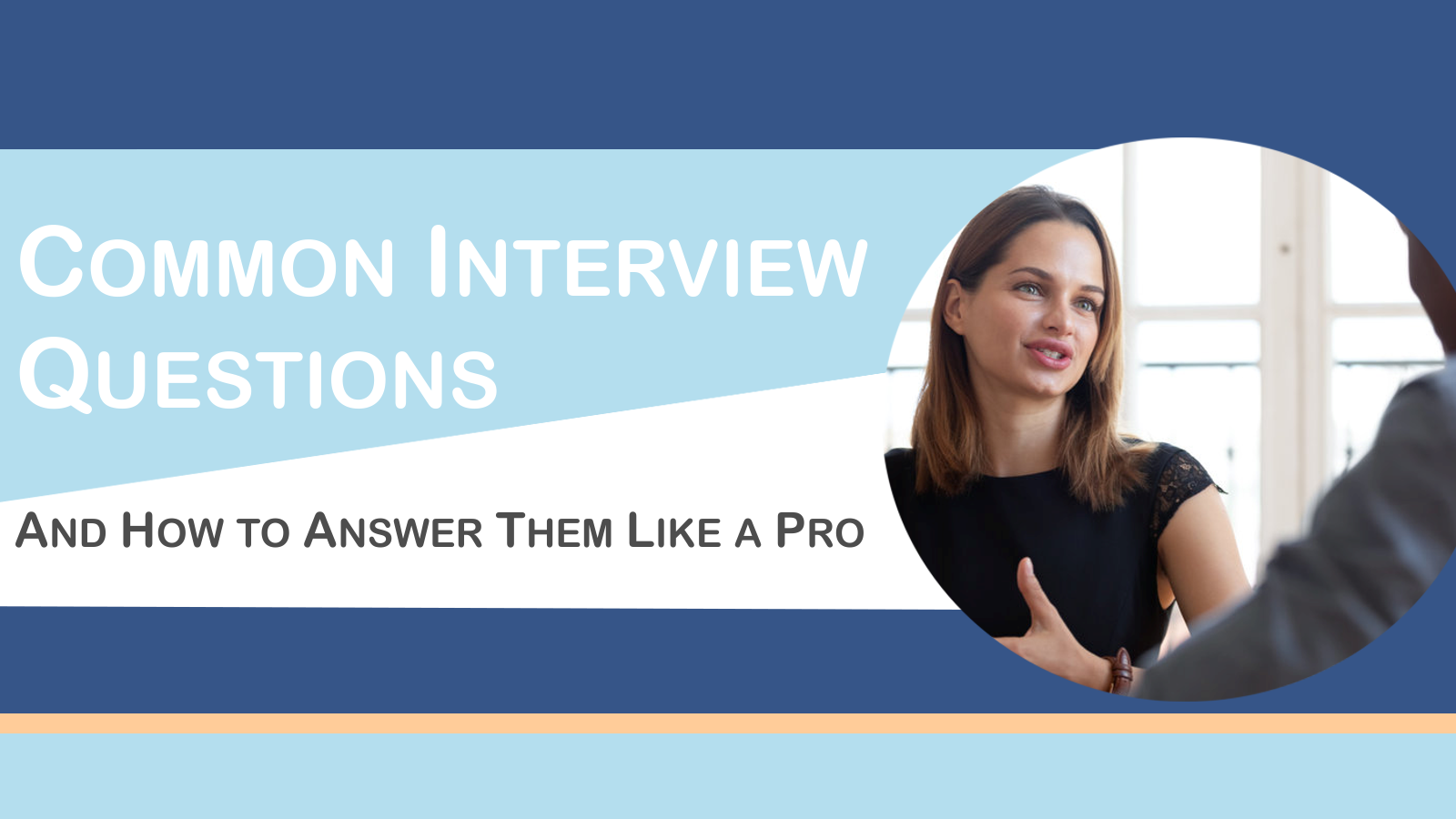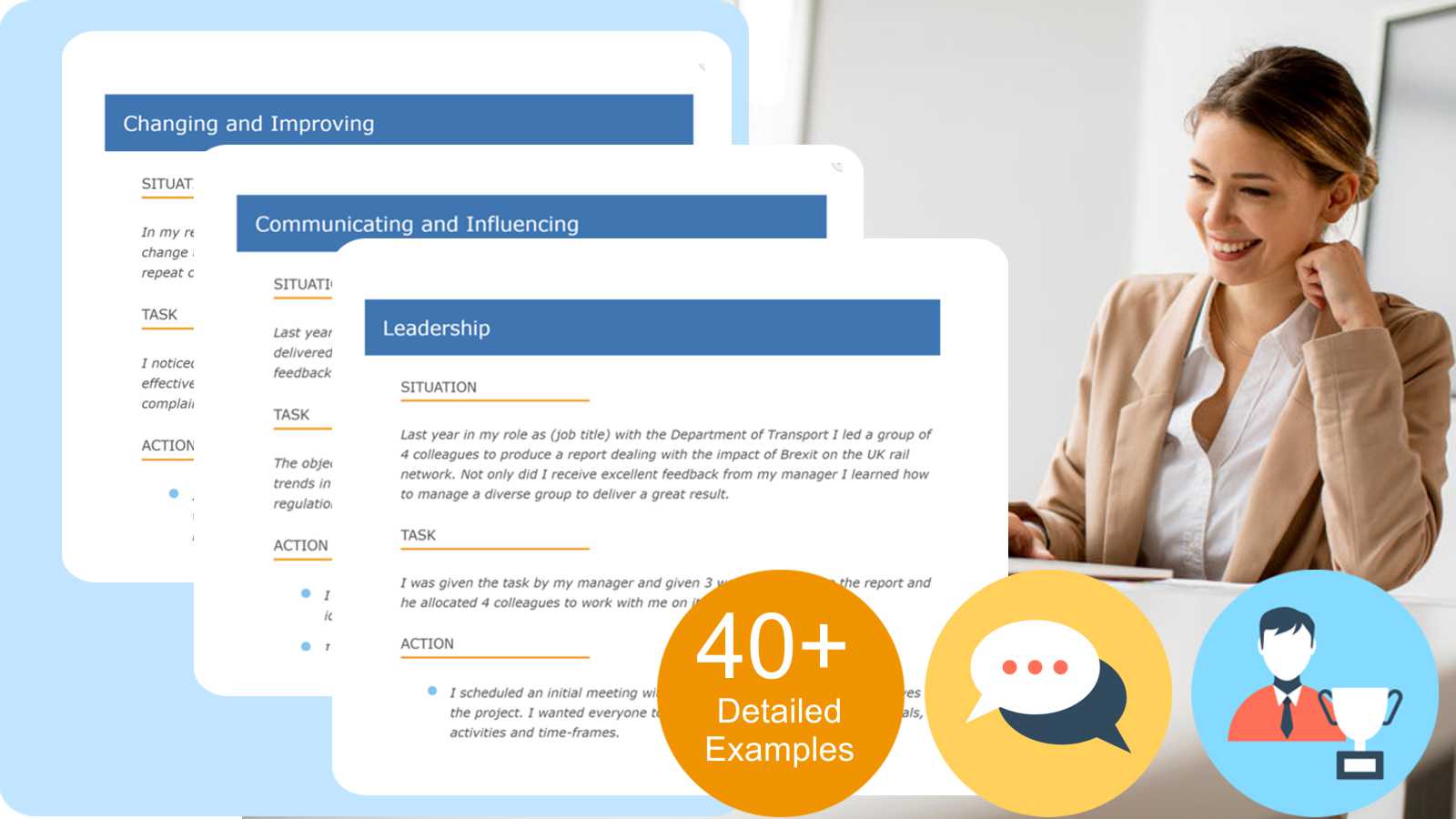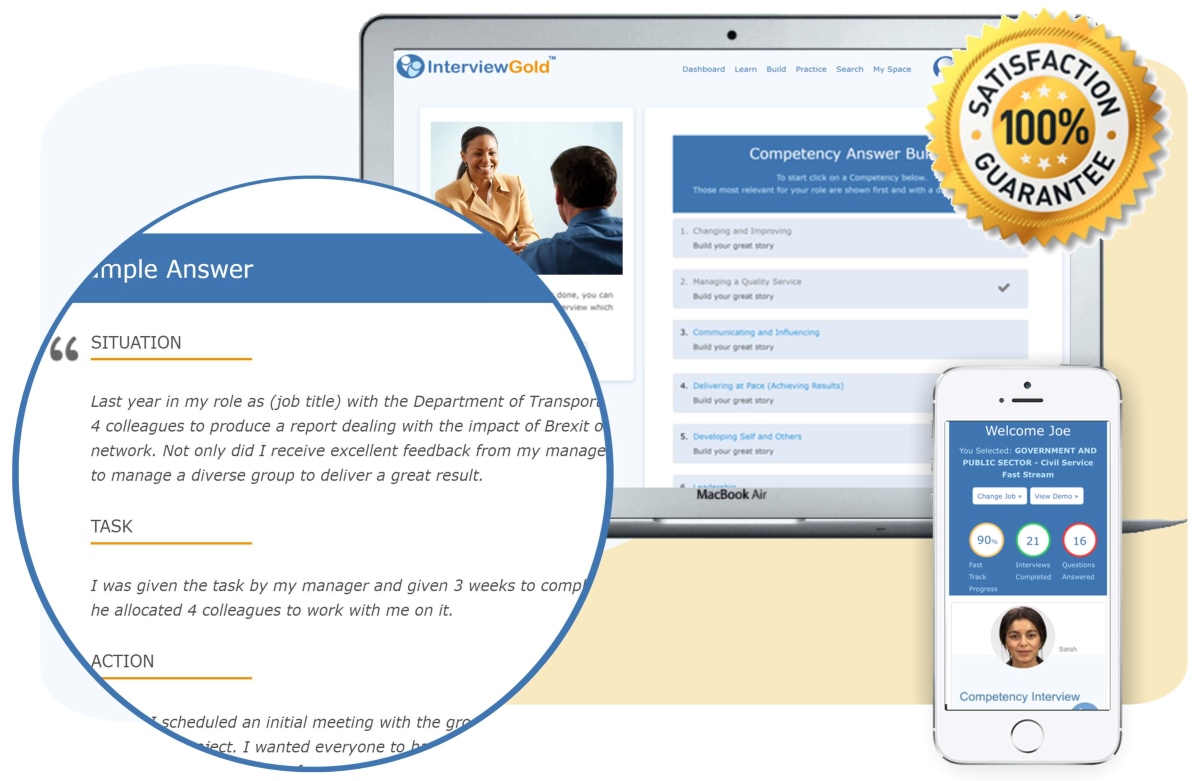
Job interview questions are constantly changing and right here in the UK, 2024 is no exception.
The recruitment process is becoming even more competitive, interview questions are becoming tougher and your interview answers will need to be top notch to get that elusive offer.
While face to face interviewing will of course dominate, we have seen how remote interviewing has become increasingly common and is here to stay during 2024.
Whether in the form of zoom, skype or other video based or by pre-recorded interviews popularly used to sift applicants.
We specialise in job interview coaching and in this article, we reveal the most common interview questions that you may be asked in any job interview in the UK.
We list 44 different interview questions and we also give you answer guides plus a refresher of the top interview techniques you must be aware of so as to pass and win jobs.
Download and keep our free Interview Questions and Answers PDF.
In this article:
- Interview Questions to Expect – Are Your Answers Up to Date?
- The Most Common Interview Question Types in UK
- The Top 10 UK Interview Questions and Answers
- Tell Me About Yourself.
- Why Have You Applied for This Job?
- Why Are You Leaving Your Current Job?
- What Are Your strengths?
- What Are Your weaknesses?
- What do You Like or Dislike Most About Your Current Job?
- What Will you Bring to the Role?
- Why Have You Chosen This Career?
- Where do You see Yourself in 5 Years Time?
- Do you have any questions for us?
- Answer Any Interview Question With 100% Confidence
Interview Questions to Expect – Are Your Answers Up to Date?
In terms of the interview questions used now, we see of course that those tough competency and behavioural interview questions are still very much in vogue.
In addition, more and more employers are now using blended interviews formats combined with strength based interview questions where they explore not only what you are good at but also what you love doing.
Despite the pandemic now well and truly consigned to the past, employers will be aware that we have all been through a challenging period.
If you are still working remotely or in some hybrid arrangement, expect some questions exploring your ability to work productively on your own and stay focussed rather than as part of a team.
For example, a typical interview question might be: How do you stay motivated while working from home?
Similarly a question exploring how you maintain or build relationships or manage a team while working remotely may be asked.
Read more: Join InterviewGold today and get accurate interview questions and expert answers for your exact job.
The Most Common Interview Question Types in UK
Questions at interview can take one of several forms.
There may be open questions that really just invite you to talk so that the interviewer can gain an insight into your attitudes, thought processes, and communication skills.
Competency and behavioural questions are now becoming the norm however many interviewers still favour the standard and traditional job interview questions such as “Tell me about yourself” and “Why should we hire you?” etc.
Here are the most common categories of interview questions in use today.
1. Competency Based Questions, Behavioural or Situational Interview Questions
Very commonly used by interviewers these questions are very specifically targeted at discovering if you have the skills (competencies) required to undertake the role. They are phrased in such a way so that you must give an example of a situation where you used that particular skill successfully. For this reason they are often called situational interview questions and they can be phrased as ‘Tell me about a time when…’ or ‘Describe a situation…’
How to Answer:
To learn how to answer competency and behaviour questions read more here: 55 Competency Based Interview Questions Answers and Examples
Give evidence through examples: You may well be asked to give an example of a situation that you have handled successfully, or where you have demonstrated clear abilities, so it is essential to be prepared for this. Try to think about recent cases which could show you in a good light, or challenges that you have overcome, and be prepared to talk about them.
Perfect Answers: Know What To Say to Win Your Next Job
2. Traditional Interview Questions
These questions are the question you have probably come across most often such as ‘What are your strengths?”, “What are your weaknesses?” “What will you bring to the role?”. They are still very commonly used and you are well advised to spend time creating answers in advance.
How to Answer:
We deal with each of these top traditional questions below: Learn more about each of the top 10 interview questions in the UK right now.
Don’t be afraid to boast: Be positive about your answers and not self-deprecating or modest in any way. If asked about your skills, don’t qualify your answer with words or phrases that show doubt, such as “I think I am good at planning and organisation.” You should be confident with strong, convincing answers such as “I am an excellent planner and organiser.”
3. Technical Interview Questions
This type of question will be very direct in its phrasing. It’s aim will be to discover just how proficient you are and can be related to a qualification, system, process or knowledge. While these skills are often tested outside of the interview room, many managers may ask questions to see how fresh your knowledge is, for example:
- What is your understanding of GAAP Reporting? (Finance or Accounting Role)
- Can you give me a summary of the main points of the Equalities Act? (HR or Manager Post)
- What are the advantages of using SQL over MS Access in database development? (Software IT)
- What steps would you take to improve our Health and Safety procedures? (Facilities Management)
- What does the concept of Clinical Governance mean to you? (Medical)
- What are the six ‘C’s, and how do they impact your daily care? (Nursing)
How to Answer:
As you can see, they are very job specific and your answer will need to show an exact and accurate understanding of the subject matter being explored.
With technical questions we find that you will either know the answer or not.
We find that answering technical interview questions requires a combination of knowledge, problem-solving skills, and effective communication. Here are some tips to help you answer technical interview questions successfully:
- Listen Carefully: This might seem obvious however we have seen so many candidates who firstly don’t listen and then give an unrelated response. This is a waste of everybody’s time. Make sure you listen carefully to the whole question first, before starting to formulate an answer in your mind. Jumping too soon may mean missing the real point of a question.
- Double-check the Question: If you are not sure about the question you should ask for it to be repeated or to be clarified. Remain focused on answering the question as accurately as possible without wandering off topic. It is important to be clear and concise, and above all, give relevant answers.
- Take Your Time: Don’t rush into answering. Take a moment to gather your thoughts and plan your response. It’s okay to ask for a few seconds to think before answering.
- Break Down the Problem: For technical problem-solving questions, break down the problem into smaller components or steps. This will help you approach the question methodically.
- Be Methodical: Explain your thought process and the steps you are taking to arrive at the solution. Interviewers are often interested in your problem-solving approach, even if you don’t immediately arrive at the correct answer.
4. Strength Based Interview Questions
A technique we are now seeing increasingly used especially in the arena of government and graduate recruitment where relevant experience is not as important as assessing a candidate’s talents, flaws and personality. They are designed to find out what you are inherently good at, what you enjoy doing and what really motivates you. The theory is that if you enjoy a task you will be more productive and efficient and employers will provide you with roles which fit your strengths better.
Read more: Read About Civil Service Strengths Based Interview Questions.
How to Answer:
When answering these types of strengths based questions, it is best to be honest. Focus on telling them what are you bringing rather than taking:
Remember that interviewers are looking for skills and abilities that will be useful to them, so you need to bring to their attention the benefits for them by employing you.
For example, if asked about why you want the job it is better to say, “I believe it will give me a better chance to use my skills”, rather than, “It seems like a good offer with a higher salary than I have at present.”
5. Hypothetical or Scenario Based Questions
These questions test your ability to think on the spot and to formulate an answer under pressure and with speed. You will be presented with a hypothetical scenario often one which crops up often in the workplace to which you are applying. To answer successfully you will need to put yourself into the role and talk through the steps you would take to deal with the situation successfully.
For example, here are some hypothetical interview questions for you to answer.
- Imagine you were managing an employee who continuously arrived late to work. How would you deal with the situation?
- One of your team is underperforming, is disruptive and causing others to become demotivated. What would you do?
- A colleague tells you they are being bullied by a member of the senior leadership team. What steps would you take?
- A customer complains about the level of service they have received from your department. How would you deal with this satisfactorily?
How to Answer:
When answering hypothetical or scenario based interview questions, you will be required to say what you would do in a given situation. They are different to competency or behavioural questions which ask about a real situation you were in.
These questions are a test of your ability to think on your feet. In addition they can be a good way to find out just how true your experience is and how you would approach difficult work situations that may occur in your day-to-day role.
We suggest the use of the TAAP Formula as a really effective way to structure your answer and you can learn about it in the InterviewGold training program.
Demonstrate your flexibility and versatility: If, for example, you are asked to describe wat you would do in a situation which required good interpersonal skills, it would be more impressive if you were able to include additional skills. For example, talk abut a case that shows you as a decision maker and leader, as well a planner and organiser.
Read more: Get detailed interview answers for your exact job and much more – 92% success rate.
6. Value Based Interview Questions
Just as strengths based interviews play to the abilities of candidates and work in favour of employers, so too the impact of modern value based techniques can benefit both sides at once, and in fairly similar ways.
- What is most important to you in life or work?
- How would you say your personal values aligns with the work we do here at our organisation?
- Tell us about a time when your values were compromised.
- Can you share a specific example of a time when you faced an ethical dilemma at work?
- Tell me about a project or task that didn’t go as planned. How did you take ownership of any mistakes or setbacks, and what steps did you take to rectify the situation?
- Describe a situation where you had to collaborate with a diverse group of colleagues with different opinions and work styles. How did you contribute to fostering a cohesive and supportive team dynamic?
How to Answer:
As the name suggests, this approach intends to work out whether the values of a candidate align with those of an organisation, often via more direct interview tactics than might be encountered elsewhere. As a result, such interviews are usually deployed in industries where qualities like compassion and an ability to collaborate effectively with others are essential, such as healthcare and the charity sector.
When answering value based questions, we suggest that honesty is the best policy.
Questions about how specific scenarios were handled in the past will require use of the the STAR formula. Answers should show how you interact with other people, what outcomes you expect from these interactions and how they fit with your personal values.
7. CV and Career Interview Questions
Of course, you should expect question exploring previous jobs, your experience and your training. In fact any item on your CV or application is open for questioning. To prepare we suggest you review your experience in advance, perhaps making bullets points regarding each of your jobs, projects and achievements outlining what you delivered and what you learned.
- Why did you choose a career in …?
- What are your career goals, both short, and long term?
- Talk us through this period on your CV? Why did you change jobs at that point?
- Tell us about the most enjoyable achievements in your career to date.
How to Answer:
Always use the first person when answering interview questions to show that you are speaking for yourself and are self- motivated and self-confident. A third person reply is impersonal and comes across as rather weak and might imply a lack of strength of character. Saying something like “We completed…” or “We delivered…” suggests your own views and ambitions tend to subjugated by the will of the group and you lack confidence in your own opinions.
Tell them what they want to hear: Although an interviewer will ask about your previous experience and achievements they will really be more interested in what you can do for the company in the future.
You should endeavour to talk about past accomplishments in a manner that shows how well they prepare you for the tasks ahead. You need to thoroughly research the company you hope to join and match up your skills and experience to what may be expected of you in the job to come.
Read more: Don’t miss out in your next job interview – learn how to boost your chance of interview success.
8. Interview Questions About Diversity, Inclusion, Equality in the UK

Employers such as the NHS and Government Departments lead by example and are role models in diversity, inclusion and equality in recruitment and representation. Private organisations follow suit and depending on the role especially if going into management you should expect to be able to answer a question about your understanding of and promotion of diversity in the workplace.
Here are some typical interview questions about diversity.
- Tell me about a time when you have shown commitment to diversity in your workplace?
- How would you boost diversity of recruitment in your team?
- What in your view are the benefits of diversity in the workplace?
- What would you do if you overheard a colleague using racist, homophobic or other inappropriate language?
- What key factors should organisations include in an effective diversity and inclusion strategy?
How to Answer:
When answering questions about diversity and inclusion, it is always best to draw on your personal experience so you can talk about the positive impact of having a diverse team in place, how you respect other people’s values or opinions when working as part of a team and how you continuously challenge inappropriate behaviour and discriminatory views.
9. Interview Questions about Career Goals and Growth
Whatever level and whichever role you apply for they will be interested in your career goals and where you see yourself heading. Career interview questions can be phrased in a range of ways for example:
- What are your career goals?
- Where do you see yourself in 2 or 5 years’ time?
- How do you see this role fitting into your career goals?
- Talk us through the goals you have achieved so far in your career?
- What are your short-term and long-term career goals?”
- How do you envision your career progressing over the next two to five years?
- What specific skills or experiences do you hope to gain in this role to support your career goals?”
- Talk us through a recent achievement where you successfully aligned your career goals with the goals of your employer?
How to Answer:
The key to a great answer is to show that the job you are applying for is a planned part of your career path. In fact, it should form one of your career goals to work within this department, organisation or industry.
For example, if your goal is to work within international development to improve or enrich societies then perhaps a role with the UK Foreign, Commonwealth & Development Office (FCDO) or the United Nations (UN) would be appropriate. If your career goal is to work with the environment or climate change projects, then an application to the Climate Change Committee or one of the host of Government and voluntary organisations would fit with that objective.
In simple terms, you will be more likely to get an offer if your interview answers show that your application satisfies a personal or career goal and this can be to work in a particular location, complete certain tasks or projects, work in a team you admire or simply take a role within a company you have always wanted to be part of and whose values match your own. Many candidates aim to work with the large household names who have positive such as the NHS, top law firms or one of the big the tech organisations, Facebook, Google, Microsoft etc.
10. Interview Questions Dealing with Gaps in Employment or Career Breaks
Some candidates we coach will have experienced redundancy or been furloughed during lockdown. Others may have chosen to take time out for a career break or raise a family, to travel and there may be an obvious gap in your employment history on your CV.
Interview questions exploring career breaks and gaps in employment can typically be straightforward and direct such as:
- Why did you take a career break at this time?
- I see there is a gap in your employment history. Can you please explain what you were doing during that time?
- How did you stay current with industry trends and maintain your skills during the gap in your employment?
- What did you learn from the experience during the period when you weren’t employed, and how do you believe it has prepared you for this role?
- Were there any specific reasons for the employment gap, and what steps have you taken to address those challenges?
- Talk us through examples of any volunteer work, freelance projects, or personal development initiatives you pursued during your career break that are relevant to this position?
How to Answer:
If you have taken time out of your career and the interviewer wants to know more, then make sure your answer is positive and shows the learning and development that took place during the gap period. For example having and rearing children is a life enhancing experience and one which can be used in a work environment. Ask any parent who needs to get kids to school in the morning and they will tell you that you need top organisational, team working and negotiation skills.
11. Pressure Based Interview Questions
Some interviewers will aim to put you under pressure by asking about some negative feedback to other aspect of your previous job. Perhaps they will seek to explore a time when something went wrong or you made a mistake or failed to deliver a project or tasks on time.
Although a few of them will seem direct to the point and easily answerable, take heed; regardless of how benign a question seems on the surface, its purpose probably has a deeper intent.
As an example, imagine you are asked this interview question:
- What do you dislike most about your current job?
- Have you ever failed to deliver against your targets?
- In a recent assessment, did you find your performance or score was not as good as you expected?
How to answer:
You may be tempted to give a very honest and casual response, due to the open nature of the question. However, this may work against you, as the interviewer is counting on your honesty to reveal or indicate any problems or difficulties you have had. They will explore further and you are at risk of revealing some issue or challenge which may rule you out for the job offer.
It is best with these types of negative interview questions to give an answer which reveals a previous weakness but one which you have overcome due to training, experience or other personal development. Turn the negative into a positive and you remove any red flags which may be attracting the interviewer’s attention.
Top 10 UK Interview Questions and Answers

In our interview coaching practice, we work with clients in a variety of industries and at a range of levels.
We also assist with recruitment in a range of sectors and we continuously gather feedback and input regarding the questions being asked.
Our research shows that the traditional big opening interview questions are still being used by many employers in the UK. They may ask 2 or 3 of them and them combine them with competency based or strengths based questions to gather a more holistic picture of you as a candidate.
Here are most common interview questions in the UK right now.
Question 1: Tell Me About Yourself.
The “Tell me About Yourself” question is one of the most common questions guaranteed to come up regardless of your sector, your experience level or your job.
It is universally popular not just in the UK and used equally by inexperienced interviewers who haven’t looked through your application before and experienced interviewers who want to get an initial overall view of you and your skills.
How to answer this interview question:
A good answer is vitally important as it can set a positive tone for the rest of the interview while a poor one can be very difficult to recover from.
Most importantly your answer must have proper structure and a smooth flow that the interviewer can easily follow. They need to hear your key messages and you should deliver them succinctly and ideally within 2-5 minutes. The content needs to be strong, relevant, to the point.
Get Instant Access to Expert Sample Answers Specific to Your Job
Join InterviewGold today, Select your job and get accurate questions plus expert answers.
Question 2: Why Have You Applied for This Job?
Why they ask this question:
The interviewer’s task is to find out what drives you when you seek a job and the reasons why you chose them as opposed to another employer. Key areas they will be interested in are:
- What attracted you to the post, what was it that encouraged you to apply?
- Do you have a genuine interest in this position or some ulterior motive?
- What aspects are most important to you, what key areas first caught your eye?
- Do you understand what your responsibilities will be and how exactly you will fulfil them?
How to answer this interview question:
There may be any number of attractive reasons to apply for a position, and they can include:
- The industry or sector the company is in, its prospects for growth and expansion, its product line and its business reputation.
- The actual job and the variety of duties and responsibilities associated with the position.
- The company’s policy regarding its employees, the overall quality of their personnel, and the advancement opportunities available.
In giving your answer, be sure to place emphasis on what you would bring to the company, instead of focusing on what the company might do for you. Also, make a point to discuss the research you have conducted, as this will demonstrate that you have specifically targeted this firm as opposed to simply applying for a job.
Use this portion of the interview to show that your skills match up with the specific requirements of the position. For example, if great communication skills are of paramount importance, talk about how yours can aid you in this type of company or role.
Question 3: Why Are You Leaving Your Current Job?
Why they ask this question:
Your interviewing panel will be curious and what they will want to discover is just how planned is your move. They will want to know if this move is part of your career progression or a sudden change of heart. Are you rushing out the door or even being pushed out. Remember, it is always better if you can show it was the pull of the new role rather than a push away from the old one which precipitated the move.
How to answer this interview question:
This is a very common interview question and here we list the following as being acceptable reasons for wanting to change jobs, but there could be additional ones you may want to include in your answer:
Progression – There simply wasn’t enough growth potential to suit your ambition
Opportunity – Your current position was no longer challenging or stimulating enough
Security – The prospects for a long term employment and advancement were lacking in your previous position
Setting – The travel and commuting has become tedious, and you are seeking a position closer to where you live
Most importantly, be sure that reason you want to leave is positive, and refrain from making any negative statements about your last company, or your superiors.
Get Exact Questions and Answers for Your Job
Select your job and get accurate questions plus expert answers. Arrive fully prepared and get the job you want.
Question 4: What are your strengths?
This interview question offers a great opportunity for you to discuss how your professional skills are perfectly aligned with main competencies of the position. It also serves as a chance to convince the interviewer that you are the best candidate for the job.
How to answer this interview question:
The key to delivering a great interview answer is in using the analysis of the position requirements combined with any other research you have conducted on the company.
Begin by asking yourself, ‘What key qualities must I demonstrate for this role, and what specific skills is the company looking for?” Then deliver a tailor-made response.
Your reply should focus on around three key attributes that are necessary and important to the position. Also, don’t hesitate to provide examples of past instances where you effectively implemented these skills to a successful outcome.
In addition, in your answers you may choose to talk about your favourable personality traits such as passion, professionalism, loyalty, and dependability, as interviewers are particularly keen on these in prospective job candidates.
Question 5: What are your weaknesses?
A top tip when answering is to turn a weakness into a positive and give a situation and a solution at the same time. For example, “I tend to be very process-oriented and get very involved with the detail. I have been aware of that and so work with other members of the team who are more result-oriented so as to bring balance and ensure the project gets delivered on time and to target..”
With this example the candidate shows an awareness of their weakness however also an ability to use the resources around them. It is also a nice example of the working together competency.
Learn 9 brilliant ways to answer the weakness interview question.
Question 6: What do you like or dislike most about your current job?
Another common interview question and worth bearing in mind there is scarcely any job out there that doesn’t contain some unpleasant aspects.
However, when answering you shouldn’t mention them during the interview process. When giving an answer to an interview question such as this, we recommend avoiding any negative discussion, and instead talk about the things you like or enjoy, all while relating those duties and responsibilities to the position you are currently applying for.
Should the interviewer insist on an account of your dislikes, focus on the lack of growth potential, stability, and location referred to above.
Question 7: What will you bring to the role?
This is a very interesting question as it challenges you to know exactly what your value is to the employer. They are asking what is it that you have that they will find useful. What are you bringing to them that is going to help them solve their problem?
It is similar in a way to the question ‘What are your strengths?’ however it goes further as it also encompasses a combination of elements both required in the role and which you possess including:
- Experience
- Knowledge
- Skills
- Energy and
- Personal traits
How to answer this interview question:
Here, the interviewer is in search of an enthusiastic answer that relates to Capability, Commitment and Compatibility. Take this as an opportunity to really demonstrate how your past accomplishments and current skill set make you the perfect candidate to hire.
Also, use examples of your prior achievements to make the point that you will fit in seamlessly, and be a valued and committed employee.
Here are our core guidelines for a great answer:
1. Analyse the job description and person specification: Highlight the skills and experience required by the company. Compare this list with your abilities and expertise.
2. Understand the employer: Gather information and understand what they are looking for. What skills do they value, what experience will they look for.
3. Choose three core requirements: List three top requirements as detailed on the job description or person specification. Choose those which are both listed as essential which you excel in and are fully confident with. This will form the basis for your answer.
4. Bring proper structure: Your interview is a communication exercise and you must structure and deliver it professionally. We include a range of formulas in the InterviewGold online training system however for this we suggest you use the ABC Formula and the Rule of 3 to structure perfectly.
5. Be confident: When answering be sure to exude confidence, self-assurance and determination, as the fact that you made it to the interview process means they are building a case to hire you, and not disqualify you. Remember to focus on the job description and refer to it when the discussion turns to how your competencies, skills, and abilities fit those particular requirements.
6. Transferable Skills: During the interview, you will want to place particular emphasis on how you wish to contribute to the company. If you are transitioning between dissimilar sectors or industries, be sure to make liberal use of the phrase ‘transferable skills’ in your answers. These are the abilities and traits that all company’s place great value on, and include great verbal and written communication skills, focus, time management, teamwork, being task-oriented, and accountability.
Question 8: Why Have You Chosen This Career?
Simply put, the interviewers want to know what first attracted you to your career. They hope to understand the motives and reasons and whether you made an early positive choice or you somehow drifted into it.
How to answer this interview question:
A good answer is one which shows a positive choice and one where you recognised your talents and the types of careers these best fit.
Refresh your memory, think back and come up with a list of factors that prompted you to this choice.
Focus on experiences which gave you a positive impression, for example, this can be a successful internship, which confirmed your desire to work in this field.
Or maybe you followed in the footsteps of someone you know. You admired how they dedicated their life to this career how inspired and excited they were about their choice and how you decided from an early age to pursue the same path. This can work also for famous representatives of the profession, who inspired you to choose this field.
Question 9: Where do you see yourself in 5 years time?
Why they ask this interview question:
I have combined these two questions simply because they are effectively asking the same thing. These questions are exploring motivation and intention and the interviewer is trying to find out how long you will stay with this post should you be offered it.
In addition, they want to see how clearly you have though out your career plan or indeed if you have one. If you have selected this role carefully and see it and the employer as a core part of your future working life, then you are more likely to stay with the role and organisation.
How to answer this interview question:
So how do you deal with the question?
Firstly, reassure the interviewer that you see your career in this Sector doing this type of work; after all this is what you excel at.
Mention how this employer is top of your list and how you can see yourself settling onto a long term career with then, continuously delivering top quality work, growing with the organisation and enjoying the challenges that come along.
While it’s impossible to predict the future and indeed you might move again in six months, your answer should simply give the interviewer confidence in your intentions. and if you do intend leaving after as short time best not to mention that as you are unlikely to get offered the role.
Read more about how to answer – Where Do You See Yourself In 5 Years Time?
Question 10. Do you have any questions for us?
This is probably the most frequently asked interview question. It comes at the end of pretty much every job interview and gives you an opportunity to find out more about the job. Find out more about the duties and tasks, what the employer wants to do in the first six months, to whom you will be reporting and how many others in the team. You can explore more about the company and its plans or indeed the strength of its balance sheet.
Answer Any Interview Question With 100% Confidence
Are you struggling with job interviews? Getting tongue tied, going blank and unsure how to answer correctly? Perhaps you are doing ok in the interview room but just not getting jobs? Whatever your situation, preparation is vital and to be more precise the ‘right’ preparation is key.
With the InterviewGold online interview training system your interview preparation is done for you and you have access to a comprehensive database of interview questions with answers.
Best of all, accessing those most relevant to you is easy; just select your job and level and it will show you those most likely to arise in your actual interview. Use these expert answer guides to win the job offer in your very next interview; after all thousands of other job seekers have done just that using the system.
Get Interview Questions with Expert Answers for Your Target Job
Get Instant Access to InterviewGold and Get The Job You Want



